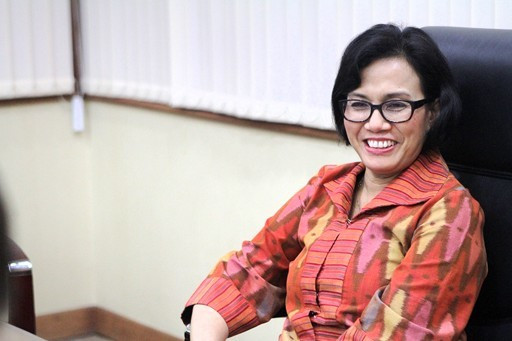Popular Reads
Top Results
Can't find what you're looking for?
View all search resultsPopular Reads
Top Results
Can't find what you're looking for?
View all search resultsAnalysis: State revenue nosedives, fueling speculation over Sri Mulyani’s exit
Change text size
Gift Premium Articles
to Anyone
A
fter a month-long silence, the Finance Ministry has finally released the state budget (APBN) performance report for January, in tandem with the February 2025 report. The delay had already stirred speculation about internal tensions within the ministry, including persistent rumors of Finance Minister Sri Mulyani Indrawati’s possible resignation.
When the report was finally published, it revealed troubling news, a sharp drop in January’s state revenue to just Rp 157.32 trillion (US$10.02 billion), a steep fall of 28.3 percent from Rp 219.31 trillion recorded in the same month last year. A key driver of this shortfall was a massive slump in tax revenue, which fell by a staggering 41.9 percent from Rp 152.89 trillion in January 2024 to just Rp 88.89 trillion this year. This plunge led to a budget deficit of around Rp 23.45 trillion, or approximately 0.1 percent of the country’s GDP.
The poor revenue performance triggered what the government referred to as “APBN efficiency measures”, resulting in a Rp 8.99 trillion budget cut in February, around 17 percent of the initially allocated Rp 53.19 trillion. Despite these efforts to rein in spending, the January and February APBN still recorded a realized deficit of Rp 31.2 trillion, or 0.13 percent of GDP.
In response, Finance Minister Sri Mulyani emphasized during a press conference that the 2025 state budget had been designed to accommodate a deficit of up to 2.35 percent of GDP. In her view, the figures from the first two months, while troubling, were still within the “safety zone.”
Still, the severity of the revenue drop and the widening deficit have raised serious questions about the government’s fiscal direction. They have also drawn fresh attention to tensions within the Finance Ministry itself. Sri Mulyani had previously warned of the need to boost state revenue to safeguard fiscal sustainability. Up until late 2024, she had strongly advocated for raising value added tax (VAT) from 11 percent to 12 percent, a move justified by the long-term need to strengthen the budget and reduce reliance on debt.
That plan, however, was abruptly reversed. Just days before the new VAT rate was set to take effect in January 2025, President Prabowo Subianto announced a last-minute adjustment to the tax harmonization law implementation, stipulating that the VAT hike would apply only to luxury goods such as yachts, jets and high-end residences, while the rest of the economy would remain taxed at 11 percent.
The announcement came so late that some businesses had already implemented the 12 percent VAT rate, later issuing refunds to customers who had overpaid.



















